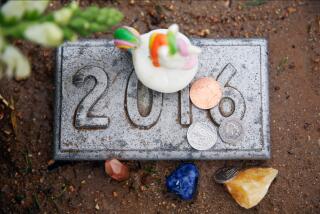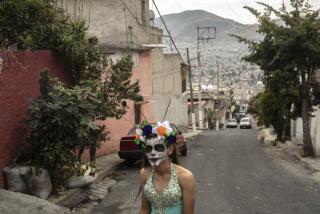A Changing World Proves Deadly to Brazil Indians : Culture: As native societies crumble under outside pressure, an epidemic of suicides afflicts the Guarani.
- Share via
CAARAPO, Brazil — Ten people have killed themselves since the beginning of the year in this rural community of 3,200 Guarani Indians. The youngest suicide was Fortunata Escobar, 10.
Fortunata’s father had been away for more than a month, working for a distillery. Her mother had died earlier in the year. Eight brothers and sisters were staying by themselves in the family’s rustic hut, with thatched roof and dirt floor.
Alone in the house with a 4-year-old sister one August day, Fortunata strung herself up by the neck from a pole in the roof.
Why? “I don’t know,” says Lourdes Escobar, Fortunata’s oldest sister. She says Fortunata hadn’t seemed upset or sad. Could she have heard about other people hanging themselves and tried it herself in play? “I think so.”
Lourdes, 20, doesn’t have much more to say about her sister’s death. Many others here seem equally unable or unwilling to explain why so many of their relatives and neighbors have hanged themselves or taken poison.
But clearly, something is deeply and desperately wrong. The epidemic of suicides in Caarapo and other communities of Guarani Indians at the southern end of Mato Grosso do Sul state shows no signs of abating.
While there is no simple explanation for the epidemic, Guarani leaders and outside analysts agree that it has to do with a breakdown of old cultural patterns and a failure to adjust to new ones.
Throughout the Americas, many native cultures are crumbling under the onslaught of outside pressures and influences. The toll in human suffering and degradation is often dramatic; perhaps most dramatic of all is the toll of Guarani suicides here in western Brazil.
*
In the first 10 months of 1995, 48 Guarani suicides were reported in Mato Grosso do Sul--double the number in all of 1994. With a Guarani population of about 30,000 in the state, that translates into an alarming annual rate of at least 160 suicides per 100,000 people.
By comparison, the yearly suicide rate among Navajos living on their U.S. reservation is 17 per 100,000, according to a U.S. Indian Health Service report based on 1987-89 data. Nationwide, the U.S. rate is about 12 per 100,000, and Brazil’s is fewer than four per 100,000, according to 1991 statistics.
The Guarani have lost most of the ancestral lands on which their culture was based. Communities that once lived by hunting, fishing and subsistence farming are now crowded onto reservations that don’t have enough land for that kind of life. Cities have sprung up nearby, tempting the natives with consumer goods and urban diversions.
Alcohol distilleries, which produce fuel from sugar cane to supplement gasoline in Brazil, recruit Guarani men for cane-cutting and other menial, low-wage jobs. Some women find work in town as domestic servants, some girls as prostitutes. Alcoholism has become widespread.
As the old ways of the Guarani have faded, their disorientation has increased. As their need for commercial goods has grown, their awareness of their poverty has sharpened. Family unity has weakened, community life has wilted, religious meaning has waned.
“For the Guarani, their life is not a life worth living,” says Antonio Brand, a Brazilian historian who has done extensive research on Guarani culture.
Brazil has a total of 250,000 to 300,000 Indians in many language and cultural groups. The Guarani are the largest group, but their numbers are now tiny compared to centuries ago.
*
Guarani-speaking peoples once dominated a large region of South America extending from northern Argentina through Paraguay and deep into southern Brazil. The total estimated Guarani population when the Spanish and Portuguese came to South America in the 16th Century was 2 million.
Today, about 25,000 of the 30,000 Guarani Indians of the Kaiowa and Nandeva tribes in Mato Grosso do Sul live on 22 small reservations scattered over rolling plains of red earth that once was forested but now is mostly farm fields and pasture. Much of their land is overgrown with a deep-rooted weed called coloniao . The Guaranis’ farming methods are rudimentary, and the soils are weak from heavy use.
“Guarani society is deeply connected to the land,” says Mauricio Souza Vilalba, a Guarani-speaking university student. Because they no longer have enough land for their traditional lifestyle, “the people are being pulled away from their roots.”
To understand the suicide problem, it is necessary to understand the strong spiritual element of Guarani culture, says Vilalba, who is active in a Roman Catholic Church agency called CIMI that does social and educational work among the Guarani. For these Indian people, all aspects of life--hunting, farming, family life and community activities--have religious significance.
*
Traditionally, Guarani religion was reinforced by a close-knit community structure led by a cacique , or religious chieftain, and by the family. As community structures have broken down and families have lost unity, the individual’s sense of religious well-being has faded, Vilalba says.
The Guarani worship a divine family headed by Nande Ru, “the great father.” Nande Ru speaks his truth through the souls and lives of the Guarani people, according to the religious tradition.
“The life of the people must mirror Nande Ru’s way of life,” Vilalba says. “Every aspect of life should be the expression of Nande Ru’s word.”
Because they can no longer live their lives in the traditional way, many Guarani find life empty of meaning, he says.
“What they are living today is no longer what Nande Ru wants; it no longer is the word of Nande Ru. They feel that they have lost the way of Nande Ru. . . .
“Suicide is a protest because a person can no longer express the word of Nande Ru. It is the withholding of words.”
*
According to Vilalba and other analysts, the use of hanging or poison in almost all Guarani suicides is a way of stopping the word, or spirit, from ascending through the throat.
Although suicide is not encouraged by the Guarani religion, he says, it is sometimes seen as a final act of valor in a life stripped of the traditional ways.
“The Guarani wants to show that he is courageous,” he says. “He needs to be admired.”
Guarani people also believe in hexes that can cause someone to commit suicide. Those whose lives do not follow tradition are considered to be vulnerable to such spells, Vilalba says.
Vilalba knows many of the people in Caarapo, including Jorge Paulo, the community’s cacique . Paulo, 77, offers a variety of explanations for the suicide epidemic.
In the cases of several youths who have killed themselves, he cites familial neglect: “Sometimes the father doesn’t work, doesn’t help his child. The child goes hungry at home and doesn’t have a lunch to take to school.”
Paulo says a widespread neglect of religious practice and prayer also leads to suicides. “If there are 1,000 Indians, only eight or nine remember God,” he says. “Nande Ru is angry.”
The solution is a concerted act of community prayer, Paulo says. “We would have to spend a whole day, two days, to pray and baptize the earth.”
Silvio Paulo, the community’s captain, or political leader, has other explanations for the suicides. He says alcohol often is involved but that the drinking is caused by “a sickness of the spirit. People are desperate,” he says.
*
And the sickness seems to be contagious. Young people who have gone to see the body of a suicide victim sometimes commit suicide themselves soon after.
“Before, they didn’t go to see the bodies. Only older people did,” Silvio Paulo says. “Today, children, youths, everyone goes.”
He says increased contact with city life has undermined Guarani customs. “Children go to school, and they go to the city. They want diversions, they want shoes, they want watches.”
But he says they become frustrated because they cannot afford many of those things. At the same time, traditional activities, such as hunting and fishing, have been lost.
But what is most lacking is religious practice and religious leadership, according to the captain, who criticizes the cacique for failing to teach and inspire religious faith.
“He no longer makes true prayers,” Silvio Paulo says. “He’s getting old. He doesn’t bring people together anymore. People don’t get together anymore to sing.”
It is clear that there is no single, simple explanation for the Guarani suicides. “There are a series of factors that add up,” says historian Brand, who is preparing a doctoral thesis on the Guarani.
Changes in economic and social patterns have had a magnified psychological impact on the Guarani because of their deeply mystical and sentimental nature, he says. “The supernatural is permanently involved in their spiritual life,” he says. “They are fantastic people.
“Personal relations, family relations, kinship relations are fundamental in their day-to-day lives,” and the breakdown in these ties can be devastating, he says.
Goncalves Araujo, 19, was caught between the old ways and the new reality of the Guarani. He married Marta Martins when she was 12 and moved into his mother-in-law’s household, as is the Guarani tradition.
*
But Araujo went off to work in a distillery with a friend, Pedro Paulo Benites. Benites says the two returned after 50 days with money in their pockets but that by the time Araujo had paid for groceries, his money was gone.
Araujo started drinking and kept at it for two days, Benites says. On the second day, his wife gave birth to a premature and sickly boy.
Shortly after the baby was born, Araujo told his wife that he was going to go sleep in a thatch-roofed shed near his mother-in-law’s house. His body was later found hanging in the shed.
“I guess he was angry because his baby was going to die,” Benites says. The baby died a week later.
(BEGIN TEXT OF INFOBOX / INFOGRAPHIC)
Suicides Soar
Guarani suicides reported in Mato Grosso do Sul state.
1995: 48*
*10 months through October
Source: Brazil’s National Indian Foundation, FUNAI
More to Read
Sign up for Essential California
The most important California stories and recommendations in your inbox every morning.
You may occasionally receive promotional content from the Los Angeles Times.













